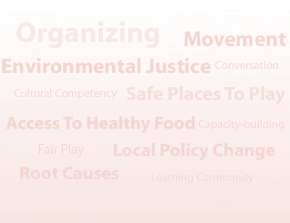This Grant Will:
- provide funding, tools and culturally competent technical support to help up to 20 communties improve food and recreation environments; and
- document this work in order to facilitate widespread replication.
Up to 20 grants will be awarded over two rounds of funding (or 10 grants per cycle). The grants will be for up to $250,000 over a three-year period. Under this first round of funding, up to 10 grants will be awarded to support local policy advocacy initiatives. Awards in the first round BEGAN on October 1, 2009, and will end on September 30, 2012.
Policy projects may address a wide range of issues related to food and recreation equity, including:
- land use regulation, such as zoning that influences the siting of retail food outlets in ways that increase availability and access to healthy food choices and/or limit access to unhealthy food choices;
- limitations on marketing and other promotion of unhealthy foods targeted to racial and ethnic communities;
- school policies that increase access to healthy food and/or limit access to unhealthy foods;
- school policies that increase physical activity during school hours;
- before- and after-school programs that improve access to recreation and increase physical activity levels;
- access to culturally competent, linguistically accessible recreation opportunities and/or equitable access to parks and places to play; and
- strategies to lower the price of healthy foods and increase the price of unhealthy foods (e.g., incentives and taxes).
Applicants are not required to specify a policy initiative in their proposal if policy options are unfamiliar to them. CCHE staff will work with successful applicants to identify a policy initiative that fits their local context. However, applicants will need to describe their local environment as it relates to childhood obesity, articulate an issue or set of issues they plan to address, and convey a sense of available community resources (e.g., constituents, local funding and skills) that will be leveraged in their policy initiative.
CCHE is designed to support a diverse learning community that uses culturally competent, community-centered approaches to advancing policies to prevent childhood obesity in communities most affected by the epidemic. All grantees will receive training and technical assistance in shaping their plans as part of their participation in the program.
RWJF will fund a geographically and ethnically diverse cohort of groups that, taken together, represent the breadth of the issue in communities most affected. The first round of CCHE grantees will serve as models for others working in communities, in indigenous nations and/or organizing youth to test and advance culturally and community-competent approaches to preventing childhood obesity.
